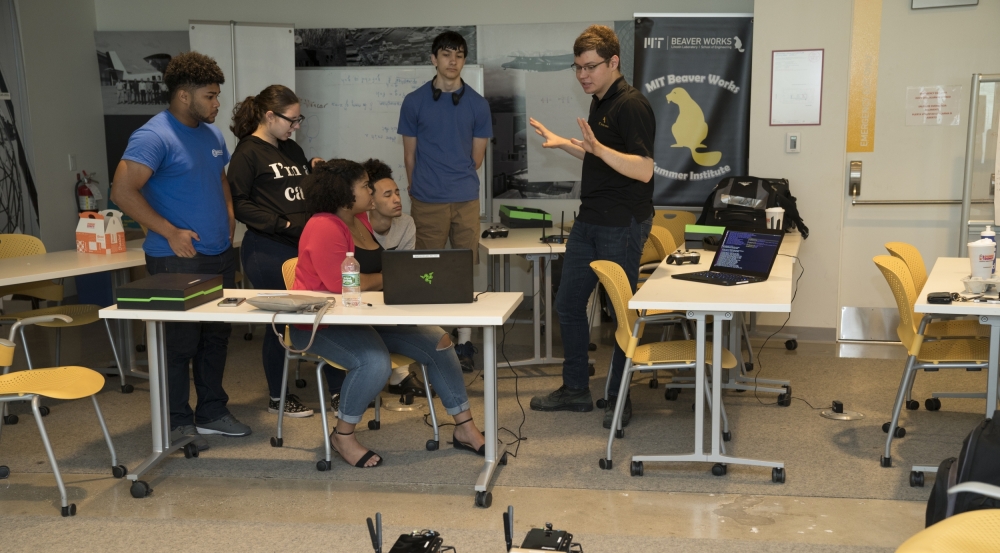High school students get ready for Beaver Works Summer Institute

On six Saturdays, from May 26 to June 30 at the Beaver Works facility in Cambridge, Massachusetts, Andrew Fishberg, a member of the staff in Lincoln Laboratory’s ISR and Tactical Systems Division, prepared students for the Rapid Autonomous Complex-Environment Competing Ackermann-steering Robot (RACECAR) course offered at the Beaver Works Summer Institute (BWSI) from July 9 to August 5. The BWSI course teaches high school seniors to program robotic cars so that they can autonomously navigate a winding racecourse. The idea for the pre-program, called the RACECAR Crash Course (RCC), was born from a desire to include students in BWSI who have the ability to tackle, but perhaps have not had the resources to be prepared for, RACECAR’s rigorous math and science.
"There are a lot of smart young people from a lot of different places," Fishberg said. "We wanted to broaden our recruitment patterns — especially now that the BWSI is growing."
The RCC program is a test drive of a method for recruiting eager, capable students from schools that may not have top-level science, technology, engineering, and mathematics (STEM) programs. Whereas students usually apply to the BWSI program after taking and passing an online course on their chosen topic, Fishberg believes the in-person instruction could help close the inequality gap among schools by being engaging and accessible. The students in the RCC were nominated by their schools to attend the course, and completion guaranteed their spot in the RACECAR course. Six students completed the pre-program on June 30.
For the RCC curriculum, Fishberg focused on the basics of programming and on teamwork, which is an essential skill for any real-world, open-ended engineering problem. "The teams that are going to be the best [in the RACECAR course] are the teams that collaborate and work well together," he said. Because of the rigorous college-level materials and fast pace of the BWSI course, Fishberg says the most productive and successful teams will be those that best leverage each member’s personal strengths. "One of the core components of teamwork is that not everybody needs to be good at every part of the puzzle," he explained.
"Knowing that it is okay not to know everything while entering this program is helpful for me," said one student from Lynn Classical High School who attended the RCC program.
Students who have a chance to become familiar with the necessary background for the RACECAR course will enter the BWSI as ready to participate as the students who completed the online tutorial.
"Experience isn’t everything," Fishberg said. "The most important thing to be successful is to be excited and eager to learn."
Fishberg plans to expand the RCC program to include more students, thus increasing the diversity and accessibility of the BWSI. An ultimate goal is to integrate the RCC curriculum directly into high schools.